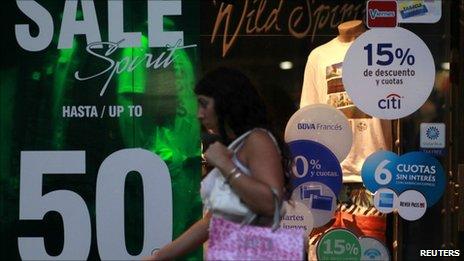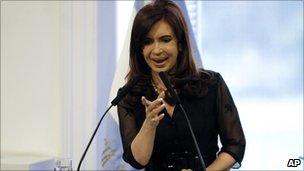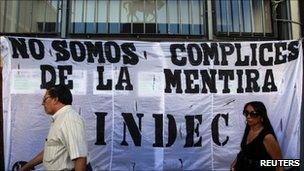Argentina's inflation rate: High, but just how high?
- Published

Inflation makes many Argentine retailers and shoppers nervous
Inflation in Argentina is a dirty word.
It is a word that evokes painful memories of previous economic crises. And it is a word guaranteed to be at the centre of the debate ahead of October's presidential elections.
It touches everybody since the price of just about everything in Argentina is rising. But there is disagreement over by how much and over why.
The official statistics office, Indec, says inflation last year was a little over 10%.
But many economists, opposition politicians and shoppers dispute that figure, believing the true figure to be between 25% and 30%. If that's the case then inflation in Argentina is among the highest in the world.
Recent Indec figures say the cost of the basic food basket for a family of four remained the same in February as it was in January.
But critics say the government is very selective about what it puts in that basket. Most Argentine shoppers would agree.
"I notice a difference every time I go shopping," says Beatriz, a mother of two. "Especially dairy products."
'Hitting poor'
One of the biggest defenders of the official rate of inflation is Commerce Secretary Guillermo Moreno, who has fined at least three independent economic consultants for publishing figures that dispute those released by the government.
A government statement said the companies' figures lacked scientific rigour and could deceive and confuse.
"The government still has inflation under control. Inflation is better than recession. Most people here are doing alright," Newspaper editor Sergio Kiernan says.
The argument among those who support President Cristina Fernandez de Kirchner's government is that wages are rising above the rate of inflation.
The restaurants and cafes are still full, people are buying new televisions and vehicle sales last year broke all records and are expected to do the same again this year.
Economy Minister Amado Boudou consistently tells the media that inflation is not a problem and his government has it under control.
"When there's a problem with prices, the government comes out to attack it," he says.
Mr Boudou angered many in Argentina when last year he said that inflation didn't affect large sectors of society. He said it might only have an impact on the upper middle class.
Political analyst Felipe Noguera disagrees. "High inflation hits the poor because it causes food prices to rise," he says.
'Dramatic' inflation

The government of Cristina Fernandez de Kirchner insists that inflation is under control
Monica Guglielmini runs a haberdashery near the centre of Buenos Aires.
"Inflation is something that everyone who comes in here complains about," she says. "It's also difficult for me to plan anything. The price of stock goes up, so does the rent and if you've got employees, they expect their wages to go up to keep pace."
Monica, who previously worked in the banking industry, adds: "Inflation makes Argentina less credible. Foreigners don't invest here and those Argentines with money take it abroad."
A recent <link> <caption>US Department of State report</caption> <altText>2011 Investment Climate Statement - Argentina</altText> <url href="http://www.state.gov/e/eeb/rls/othr/ics/2011/157233.htm" platform="highweb"/> </link> referred to what it called "the dramatic rise in the level of inflation in recent years".
Concern over inflation, the report said, "may diminish the attractiveness of prospective investments in some sectors".
Some blame Argentina's inflation on the lack of long-term investment in the country, both foreign and national.
One report estimates that in the past two years Argentines have shifted about $12bn (£7bn) abroad.
Boom-and-bust economy

Truth, lies or statistics in Argentina?
Others say it is because the government is spending from the central reserves, while some point the finger at speculators who put up prices in anticipation of more inflation - thus putting pressure on others to put their prices up too.
But business leaders have recently issued a statement firmly putting the blame on the government. It said: "The main cause of inflation is public spending."
With the elections looming in October, most analysts predict that government spending will increase. The powerful trade unions are calling for wage increases of between 20% and 30%.
Argentina has a boom-and-bust economy. Older people remember the hyper-inflation crisis of 1989 when prices rose by the day, provinces issued their own currencies and savings rapidly lost their value.
The economy, thanks largely to soya exports, has emerged from the last major economic and social upheavals of 2001-2002, which was also followed by a period of inflation.
Inflation, despite government reassurances, makes many Argentine retailers nervous, and they're tempted to put their prices up.
Meanwhile, the government is forced to work harder to convince shoppers, who in October become voters, that they have the economy under control.